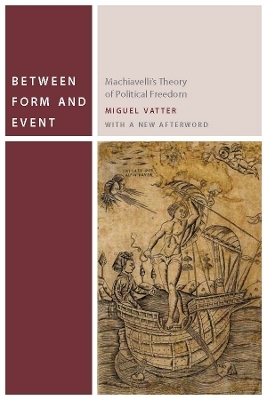
Between Form and Event
Machiavelli's Theory of Political Freedom
Seiten
2014
Fordham University Press (Verlag)
978-0-8232-5594-8 (ISBN)
Fordham University Press (Verlag)
978-0-8232-5594-8 (ISBN)
A study of Machiavelli’s theory of politics and history which takes as its basis a radical theory of freedom as non-domination and a philosophy that gives priority to events over forms.
Machiavelli uncovers the productive function of social conflict in establishing a new idea of popular power and its legal institutions whose function is to relativize the command of the state and check the abuses of the privileged groups in society. Henceforth, every legitimate form of government must at the same time be inscribed with its immanent critique and imminent subversion: The possibility of political form is conditioned by the possibility of changing it in an event of political revolution.
The book argues that Machiavelli’s new understanding of political freedom presupposes a revolutionary change in the way that history is conceived. Machiavelli changes the paradigm of action from the classical idea that virtue means acting in correspondence to what the times demand to a modern idea of virtue wherein acting means going against the times in order to effect a radical new beginning. In so doing, Machiavelli becomes the first political philosopher of the event.
Machiavelli uncovers the productive function of social conflict in establishing a new idea of popular power and its legal institutions whose function is to relativize the command of the state and check the abuses of the privileged groups in society. Henceforth, every legitimate form of government must at the same time be inscribed with its immanent critique and imminent subversion: The possibility of political form is conditioned by the possibility of changing it in an event of political revolution.
The book argues that Machiavelli’s new understanding of political freedom presupposes a revolutionary change in the way that history is conceived. Machiavelli changes the paradigm of action from the classical idea that virtue means acting in correspondence to what the times demand to a modern idea of virtue wherein acting means going against the times in order to effect a radical new beginning. In so doing, Machiavelli becomes the first political philosopher of the event.
Miguel Vatter is Professor of Political Science at the University of New South Wales, Australia. He is the editor of Crediting God: Religion and Sovereignty in the Age of Global Capitalism (New York, 2010) and author of The Republic of the Living: Affirmative Biopolitics and Civil Society (New York, 2014). He is a founding member of the biopolitics research network BioPolitica.cl.
| Reihe/Serie | Commonalities |
|---|---|
| Nachwort | The Author |
| Verlagsort | New York |
| Sprache | englisch |
| Maße | 155 x 235 mm |
| Themenwelt | Geisteswissenschaften ► Philosophie ► Geschichte der Philosophie |
| Geisteswissenschaften ► Philosophie ► Philosophie des Mittelalters | |
| Sozialwissenschaften ► Politik / Verwaltung ► Politische Theorie | |
| ISBN-10 | 0-8232-5594-8 / 0823255948 |
| ISBN-13 | 978-0-8232-5594-8 / 9780823255948 |
| Zustand | Neuware |
| Informationen gemäß Produktsicherheitsverordnung (GPSR) | |
| Haben Sie eine Frage zum Produkt? |
Mehr entdecken
aus dem Bereich
aus dem Bereich
eine Geschichte der Zuversicht von Homer bis zum Klimawandel
Buch | Hardcover (2024)
C.H.Beck (Verlag)
28,00 €
die kolonialen Wurzeln der französischen Theorie
Buch | Hardcover (2024)
Matthes & Seitz Berlin (Verlag)
28,00 €


